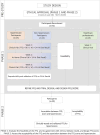Dietary assessment and prevention of hypertension in Nigeria: Protocol for a retrospective cross-sectional study for the development and validation of a food frequency questionnaire for clinical use
- PMID: 38630757
- PMCID: PMC11023198
- DOI: 10.1371/journal.pone.0292561
Dietary assessment and prevention of hypertension in Nigeria: Protocol for a retrospective cross-sectional study for the development and validation of a food frequency questionnaire for clinical use
Abstract
Contrary to North America and Europe, the prevalence of hypertension is rising in West Africa. With a transition from whole foods to processed foods in Nigeria, diet plays a key driver of hypertension. To combat this, the national nutritional guidelines in Nigeria were implemented, but their translation into actionable tools for clinicians remains a challenge. Currently, there are no simple dietary assessment tools that are concise and suitable to be incorporated into clinical care without requiring extensive data analysis while still providing personalised dietary support to their patients. This study aims to deliver a clinically tested and validated short dietary assessment tool for clinicians, patients, and researchers across Nigeria to provide personalised dietary advice for patients with hypertension. The study will be conducted in two phases: Phase 1 (n = 75) will investigate the feasibility of the short FFQ and its agreement with 24-hour dietary recalls (3x) in a clinical setting in Nigeria. During the analysis of Phase 1 data, a scoring system will be developed based on the associations between individual food items in the FFQ and measures of hypertension. Phase 2 (n = 50) will assess the acceptability of the FFQ and validate the association between the FFQ score and hypertension. Expected outcomes: The development of a clinically tested and validated short food frequency questionnaire that will be ready to use by clinicians, patients, and researchers across Nigeria to support the prevention and management of hypertension. This study will contribute to knowledge on dietary assessment and hypertension prevention by developing a validated and acceptable FFQ, which will be valuable for clinicians and researchers for personalised dietary recommendations to combat hypertension in Nigeria.
Copyright: © 2024 Batubo et al. This is an open access article distributed under the terms of the Creative Commons Attribution License, which permits unrestricted use, distribution, and reproduction in any medium, provided the original author and source are credited.
Conflict of interest statement
The authors have declared that no competing interests exist.
Figures


Similar articles
-
Relative Validity and Reproducibility of a Food Frequency Questionnaire to Assess Food Group Intake in Pregnant Jordanian Women.J Acad Nutr Diet. 2019 Aug;119(8):1349-1361. doi: 10.1016/j.jand.2019.02.009. Epub 2019 Apr 25. J Acad Nutr Diet. 2019. PMID: 31031107
-
Development and validation of a quantitative food frequency questionnaire to assess dietary intake among Lebanese adults.Nutr J. 2020 Jul 6;19(1):65. doi: 10.1186/s12937-020-00581-5. Nutr J. 2020. PMID: 32631430 Free PMC article.
-
Development and Pilot Study of myfood24 West Africa-An Online Tool for Dietary Assessment in Nigeria.Nutrients. 2024 Oct 15;16(20):3497. doi: 10.3390/nu16203497. Nutrients. 2024. PMID: 39458492 Free PMC article.
-
Nutritional Assessment in Inflammatory Bowel Disease (IBD)-Development of the Groningen IBD Nutritional Questionnaires (GINQ).Nutrients. 2019 Nov 12;11(11):2739. doi: 10.3390/nu11112739. Nutrients. 2019. PMID: 31726688 Free PMC article. Review.
-
Dietary assessment methods for intakes of iron, calcium, selenium, zinc and iodine.Br J Nutr. 2009 Dec;102 Suppl 1:S38-55. doi: 10.1017/S0007114509993138. Br J Nutr. 2009. PMID: 20100367 Review.
Cited by
-
The Nigerian Dietary Screening Tool: A Step toward Improved Patient-Clinician Communication in Nigerian Hospitals: A Pilot Implementation Study.Nutrients. 2024 Jul 16;16(14):2286. doi: 10.3390/nu16142286. Nutrients. 2024. PMID: 39064729 Free PMC article.
-
Evaluating modifiable hypertension risk in Nigerian adults-The Nigerian diet risk score.Trop Med Int Health. 2025 Apr;30(4):260-272. doi: 10.1111/tmi.14089. Epub 2025 Feb 10. Trop Med Int Health. 2025. PMID: 39925098 Free PMC article.
-
Association of Dietary Intake of Vitamin A With Adolescent Hypertension: A Cross-Sectional Study Based on NHANES 1999-2018.Food Sci Nutr. 2024 Dec 30;13(1):e4643. doi: 10.1002/fsn3.4643. eCollection 2025 Jan. Food Sci Nutr. 2024. PMID: 39803286 Free PMC article.
References
-
- WHO Hypertension Factsheet. World Health Organization; 2021. Available from: https://www.who.int/news-room/fact-sheets/detail/hypertension, https://www.who.int/news-room/fact-sheets/detail/hypertension.
-
- WHO. Global Health Observatory. Prevalence of hypertension among adults aged 30–79 years 2022. Available from: https://www.who.int/data/gho/data/indicators/indicator-details/gho/preva..., https://www.who.int/data/gho/data/indicators/indicator-details/gho/preva....
MeSH terms
Grants and funding
LinkOut - more resources
Full Text Sources
Medical

